Newsletter
Weibo Watch: Doing Homework at the Hospital
Much lies behind the image of Chinese kids doing their homework in hospitals. We discuss that powerful image, the latest film about Zhang Guimei, the Three Subject Dance, and the Weibo hashtags to know.
Published
1 year agoon
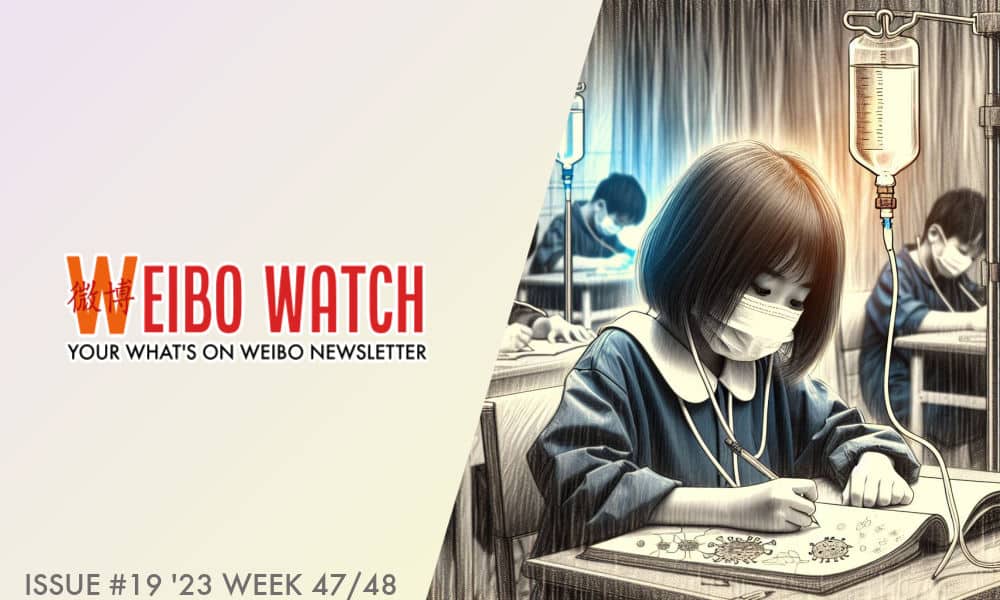
PREMIUM NEWSLETTER | ISSUE #19
This week’s newsletter:
◼︎ 1. Editor’s Note – Homework at hospitals
◼︎ 2. What’s Featured – A closer look at the featured stories
◼︎ 3. What More to Know – Highlighting 8 hot topics
◼︎ 4. What Lies Behind – Observations beyond the headlines, by Miranda Barnes
◼︎ 5. What’s Noteworthy – Much ado about fried eggs
◼︎ 6. What’s Popular – Shaoxing opera draws in a new kind of audience
◼︎ 7. What’s Memorable – One year since the ‘White Paper Protests’
◼︎ 8. Weibo Word of the Week – “Subject Three Dance”, a viral hit
Dear Reader,
‘What is this mysterious illness coming from China?’ ‘I heard Chinese hospitals are filled with kids?’ ‘Are face masks mandatory again?’ ‘Is the Health Code coming back?’ Over the past two weeks, while I was lying in bed with a fever of 39 degrees, I received numerous messages from non-Chinese friends expressing concern about images circulating online showing parents and their sick kids lining up in Chinese hospitals. For some, these scenes evoked memories of the early days of the pandemic and worries about an unknown virus.
While attracting global attention, the recent surge in China’s respiratory illnesses even prompted the World Health Organization to request more information from China about the clusters of pneumonia in children. Chinese health authorities reported no detection of unusual or novel pathogens. This current wave, occurring as China enters its first full winter season since the end of its ‘zero Covid’ restrictions, appears to be a mix of Mycoplasma infections, influenza, Covid-19, Norovirus, and Adenovirus. Coughs, colds, and fevers are notably affecting school-aged children.
A particular image that went viral recently showed Chinese school children doing homework while hooked up to an IV in the hospital. To some on the X platform, the image seemed so bizarre that they questioned its authenticity, suggesting it was fake or AI-generated. The English-language state media outlet SHINE (Shanghai Daily) clarified in one of its recent articles that the image was, in fact, real, and that study areas at some hospital infusion centers have been around since at least 2019.
However, that particular article, titled “AI-generated? Photo of Chinese students doing homework in hospital stirs X debate” was later taken offline and now leads to a 404 page.

Perhaps the disappearance of the article reflects the discomfort surrounding the scenes of Chinese schoolkids doing homework at hospitals. For many, seeing children in hospitals is already disheartening, but the sight of them doing homework in that setting –gasp– is the most dreadful thing they can imagine while also feeding into prejudiced ideas some foreigners may hold about life in China.
One thing I noticed about those messages I received about the images and videos depicting the surge in respiratory illnesses in China is that many people, especially those speaking from a European perspective, assume that children receiving IV fluids at the hospital must be seriously ill. The idea of letting such children do their homework is simply inconceivable.
In reality, it doesn’t necessarily take much to receive IV fluids in many Chinese hospitals or clinics. Unfortunately, part of China’s healthcare culture involves a profit-driven approach that can lead to over-prescriptions, excessive antibiotic use, unnecessary admissions, and the administration of intravenous fluids. Coupled with patients’ preference for hospital-based services and widespread expectations that IV infusions will make them feel better and speed up recovery, it’s not surprising that the practice of administering IV therapy has become routine among Chinese patients, even when their symptoms are mild.
Despite the prevalence of IV use and the many concerned parents who (partly also due to a lack in General Practictioners) are quick to take their sick kids to hospitals and clinics, the image and news articles of children doing their homework in hospitals also triggered discussions on Chinese social media.
The main point of discussion was not that the kids were too ill to do their homework nor that it was bizarre (many people actually praised local hospitals for setting up special study corners); the main focus was how these images embodied the concept of nèijuǎn 内卷, “involution.”
This buzzword has been generating discussions on Chinese social media for years now, and represents the competitive circumstances in academic or professional settings in China where individuals are compelled to overwork because of the standard raised by their peers who appear to be even more hardworking. One popular slogan used by a Chinese cram school showed that this societal rat-race already starts at a very young age: “If you come to us, we will train your kids, if you don’t come to us, we will train the competitors of your kids.”
Chinese clinics and hospitals offering special study rooms or homework corners for kids are actually also part of this ‘rat race.’ One hospital in Nantong, Jiangsu, recently opened up its brand-new study corner in the IV area (输液区一角“学习区”). A spokesperson argued that the hospital does not encourage parents to let their sick kids do homework at the hospital while hooked onto an IV. Still, without such spaces, kids would end up doing homework on floors and in dimly-lit hallways, creating a messy situation and making them even more uncomfortable.

Similarly, schools in Beijing have clarified that students who are ill are not required to finish their homework. Parents have also voiced their opinions, saying they don’t want their kids to do school work when they are ill, but the pressure is simply too much to avoid it.
Much lies behind the image of Chinese kids doing their homework at a hospital, but there’s also a lesson in how quickly people jump to conclusions without understanding the context. While that powerful image is interpreted differently in various contexts, one thing most people seem to agree on is that it’s never a bad idea to take things slow when feeling ill, especially for kids who could use a break.
As I pour myself another hot water with honey and ginger, I hope you also take care of your health during this cold and flu season and remember to take a pause from the everyday rat race, no matter your age or location.
Best,
Manya
What’s Trending
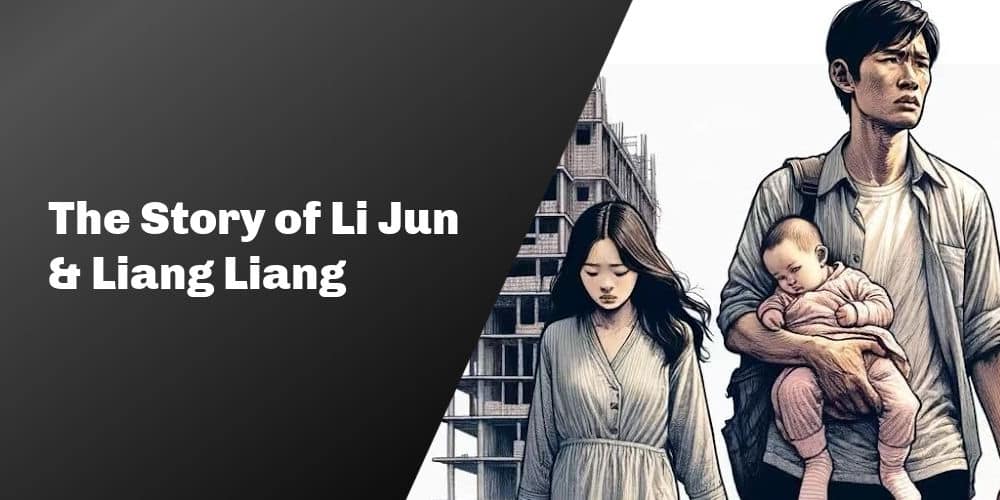
1: The Challenges of an Ordinary Chinese Couple | Two years after they first started sharing their story on Chinese social media, millions of netizens are engrossed in the struggles of the Chinese young parents Li Jun and Liang Liang, whose journey of starting a family and buying an apartment in the city at a time of economic downturn turned into an emotional rollercoaster.
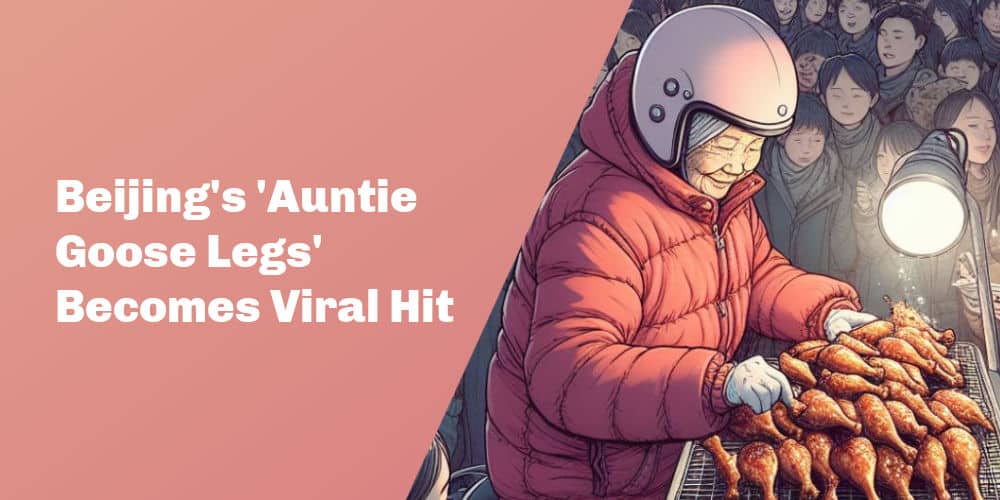
2: Overwhelming Success of a Haidian Food Vendor | A Beijing food vendor, affectionately known as ‘Auntie Goose Legs,’ has become a viral sensation after becoming super popular among the city’s student community. However, this beloved ‘auntie’ has caused quite a commotion recently after relocating her stall, triggering debates among local students over which university she truly ‘belongs’ to.

3: Hu Xijin and Others Discuss Dutch Politics | The Dutch general elections on Tuesday, November 2022, resulted in a victory for the right-wing Freedom Party (PVV). The party, established in 2006, is led by the 60-year-old Dutch politician Geert Wilders who is known for his outspoken populist rhetoric and anti-establishment sentiments. On Chinese social media, the Dutch election outcome became a topic discussed by some well-known bloggers.
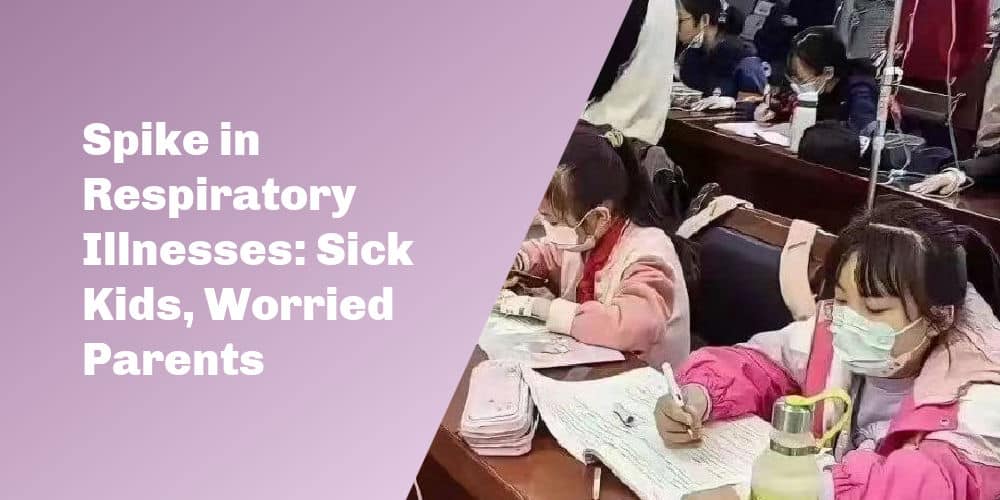
4: Hospitals Flooded during Wave of ‘Flu’ Cases | Recent discussions on Chinese social media platforms have highlighted a notable surge in flu cases. The ongoing flu season is particularly impacting children, with multiple viruses concurrently circulating and contributing to a high incidence of respiratory infections. Among the prevalent respiratory infections affecting children are Mycoplasma pneumoniae infections, influenza, and Adenovirus infection. The spike in flu cases has resulted in overcrowded children’s hospitals in Beijing and other Chinese cities. Parents sometimes have to wait in line for hours to get an appointment or pick up medication.
What More to Know
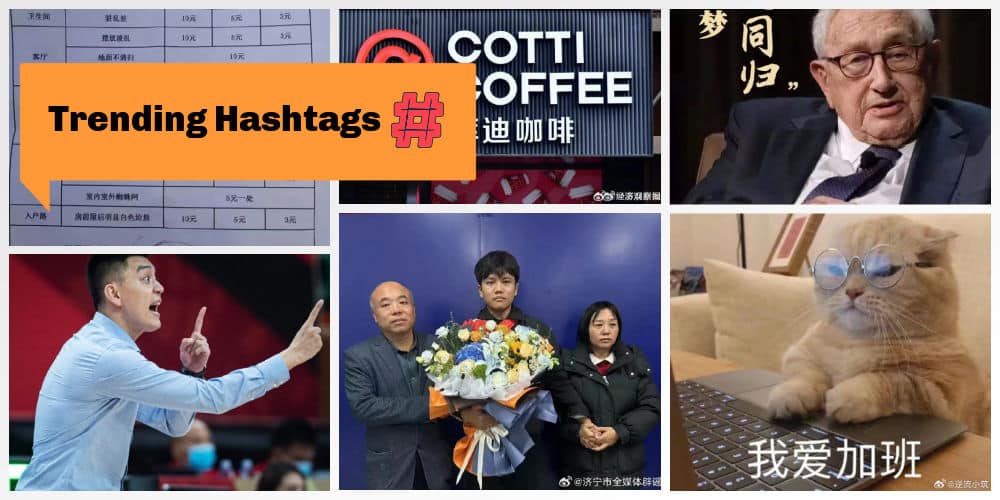
◼︎ 1. “OLD FRIEND OF CHINA” KISSINGER DIES AGED 100 | The death of the 100-year-old Henry Kissinger made international headlines this week. In China, the former US Secretary of State is mostly remembered as “an old friend” of the country. His lifelong connection to China started in 1971, when he traveled to Beijing for a private meeting with Premier Zhou Enlai to plan the details of the significant and groundbreaking visit by President Nixon, which eventually took place in February 1972. Kissinger would eventually visit China over a 100 times, even after his retirement. His last visit to China took place in July of 2023, when he attended a meeting with President Xi Jinping. This week, Xi sent a condolence message to President Biden and extended sincere condolences to Kissinger’s family. Kissinger’s book On China is still a much-read classic in China.
Besides grieving over the death of Kissinger, Chinese netizens also mourned the loss of another American this week, namely Charlie Munger. The legendary investor, who had many fans in China, died at the age of 99. (Weibo hashtag “Kissinger Passes Away” #基辛格逝世#, 680 million views).
◼︎ 2. GETTING FINED IN SICHUAN’S PUGE | In November, the leaders of a village in Puge, a county in southern Sichuan Province, sparked heated debates by introducing new regulations. According to these rules, local residents could potentially face fines for maintaining a ‘dirty and disordered’ (‘脏乱差’) living environment. Examples of offenses include leaving spider webs in the home, having an untidy bed, or neglecting to do the dishes. The fines range from 3 yuan to 30 yuan ($0.42-$4.20). While some commenters believe that these regulations reflect the village’s attempt to promote cleanliness and order, an online poll revealed that the majority of respondents disagree with the idea of local village leaders imposing fines for personal messiness. (Weibo hastag “Place in Sichuan Gives 10 Yuan Fine for Not Folding Blanket” #四川一地规定不叠被子罚10元#, 140 million views).
◼︎ 3. VISA-FREE CHINA TRAVEL FOR 5 EU COUNTRIES + MALAYSIA | On November 24, China’s Foreign Ministry announced that, starting from December 1st 2023, individuals holding ordinary passports from France, Germany, Italy, the Netherlands, Spain, and Malaysia can enjoy visa-free entry to China for business, tourism, family visits, and transit, as long as their stay does not exceed 15 days. This initiative, which aligns with China’s broader efforts to boost tourism and promote international exchanges, will continue until November 30, 2024. On Weibo, many netizens expressed disappointment that the visa-free travel regulation was unilateral; Chinese travelers still need a visa to enter these countries. (Weibo hashtag “China Tries Out Visa-Free Policy for France, Germany, Netherlands, Italy, Spain, and Malaysia” #中方将对法德意荷西马六国试行免签政策#, 110 million views.)
◼︎ 4. CIVIL SERVANTS EXAMS | The yearly national public servant exams in China began last Sunday. With over 3 million candidates, this year marks a historically high number of candidates who are vying for the available 39,600 job openings in central government agencies and affiliated institutions – twice the amount of positions that were available in 2019. (Weibo hashtag “Average of 77 People Competing for One Position for 2024 National Exam” #2024国考平均约77人竞争一岗位#, 34 million views).
◼︎ 5. PINDUODUO’S 11-11-6 WORK SCHEDULE | As news circulated on November 29 that Pinduoduo, the Chinese online retailer, was on the verge of surpassing Alibaba as China’s most valuable e-commerce firm (spoiler: Alibaba remained the largest by day’s end), discussions about the company’s demanding work schedule gained traction on Weibo. According to insiders, employees are required to follow an “11-11-6” work system: start work at 11:00 a.m., get off at 11:00 p.m., and work six days a week. Sometimes they allegedly also work overtime until the early hours of the morning, making 70-hour work weeks. The harsh work culture at Pinduoduo already triggered national debates in 2021 after the sudden death of a 22-year-old female employee. (Weibo hashtag “Pinduoduo Work System” ##拼多多 工作制##, 50.9 million views).
◼︎ 6. COTTI COFFEE GOES TEA CAT | Cotti Coffee (库迪咖啡), founded by Charles Lu and Jenny Qian, former Luckin Coffee executives who departed in 2020, has expanded to over 5,000 locations across more than 300 cities in five countries. The brand gained attention last week with the announcement of its entry into the tea market. Starting from January 2024, Cotti is set to unveil its Milk Tea brand “Tea Cat” (茶猫), which is now in its pilot store testing phase. Given Cotti’s remarkable growth over the past 2 years, we can anticipate a surge in the number of ‘Tea Cat’ outlets in Chinese cities in the near future. (Weibo hashtag “Cotti Coffee Marches into the Tea [Industry]” #库迪咖啡进军奶茶#, 42,5 million views).
◼︎ 7. CHINESE BILLIONAIRE BUSINESSMAN REUNITED WITH SON | On December 1st, Jie Kefeng (解克锋), a wealthy Chinese entrepreneur from Hebei who had offered a million yuan reward to find his missing son, Jie Qingshuai (解清帅), finally reunited with him after 25 years. Jie Kefeng and his wife held a thank-you banquet on December 2nd, which attracted considerable attention online. Jie Qingshuai, the couple’s second son, was abducted in 1998 when his mother left him at home to run a quick errand. The couple never gave up on finding their son and finally, through the help of anti-child trafficking authorities and technology, they found their son, who was sold by human traffickers as a child. The people responsible for his kidnapping have since been arrested. (Weibo hashtag: “Billionaire Family Throws 26th Birthday Party for Abducted Son” #亿万富翁全家为被拐儿子补过26岁生日#, 32.2 million views).
◼︎ 8. YANG MING’S LOVE STRUGGLES | The renowned Chinese basketball player and head coach of the Liaoning Flying Leopards, Yang Ming (杨鸣), took center stage on Chinese social media this week due to rumors about his divorce from his wife Tang Jialiang, with whom he has two children. Despite Yang Ming being a prominent figure in the sports realm rather than in the Chinese entertainment circle, the private aspects of his life, particularly his romantic relationships, continue to captivate netizens who have been following the gossip surrounding the handsome coach for years. This heightened interest is fueled by past speculations of Yang Ming being involved with a female college student. His current romantic interest supposedly is a 45-year-old music teacher. (Weibo hashtag “Exposed: Yang Ming Divorced” ##杨鸣被曝离婚##, 430 million views).
What Lies Behind
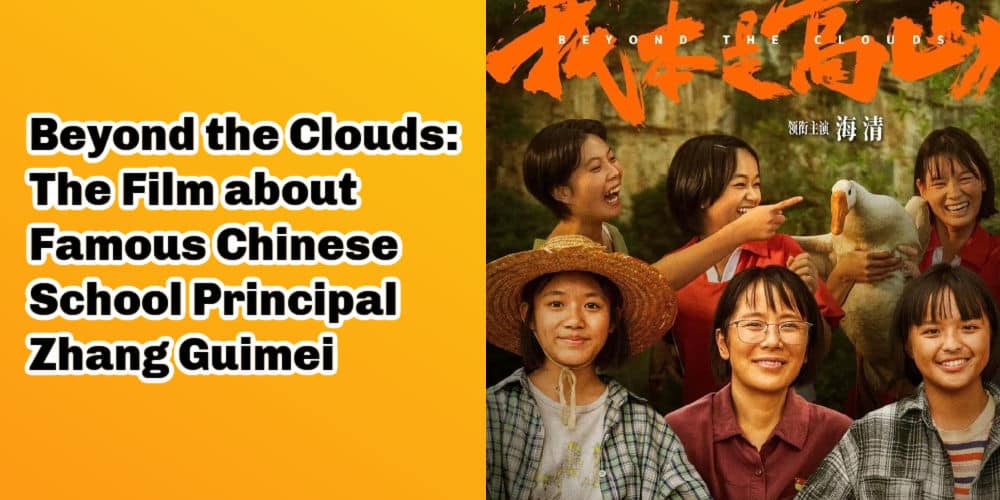
Discussions over ‘True Feminism’
Beyond the Clouds (我本是高山) is a biographical film that premiered in China on November 24. Directed by Zheng Dasheng (郑大圣) and Yang Jin (杨锦), the film portrays the life of Zhang Guimei (张桂梅, 1957), a nationally renowned female principal who manages a girls’ school in the impoverished Huaping County, Lijiang, Yunnan province.
As a teacher in Huaping County, Zhang noticed many girls dropping out of school, forced into marriage or work. In many underprivileged areas of China, where sons are often favored over daughters, girls’ education takes a hit when finances are tight. Driven by her commitment to the higher Communist cause and the belief in the pivotal role of female education in shaping the nation’s future, Zhang established the first free girls’ school in China in 2008 with the help of donations. Over the past 15 years, this school has sent over 2000 girls to universities, setting them on diverse career paths.
Over the past decade, Zhang Guimei’s selfless work has been praised by the people and recognised by the authorities. In 2021, she even received a medal from Xi Jinping for her lifelong dedication to girls’ education in rural China, precisely where women’s emancipation is most crucial. Despite her popularity as a feminist championing girls’ education in China, the film has faced criticism for distorting elements of her story.
For instance, the film portrayed Zhang’s motivation to sustain the school as a personal response to mourning her husband’s early death. Feminist supporters of Zhang argue that this narrative transforms her commitment to a higher cause into a personal and romantic motive: ‘Can’t she just be doing this because she believes in the importance of female power? Why does everything have to be motivated by a man?’ they challenged.
Another point of discussion is how the film portrays female students skipping school to go shopping or hang out at internet cafes. Many commenters argued that this is far from the reality, “do you know how much these girls value their opportunity to continue school? Why do you portray them like that?” Another reason why some argued the movie was actually not supporting the feminist cause is how it changed a real story relating to an abusive alcoholic father into one about an alcoholic mother instead. Outraged, some fans of Zhang’s work see these kinds of seemingly trivial changes as an attack on Chinese women, going against the nature of Zhang’s lifework.
Although Chinese state media is promoting Beyond the Clouds through online platforms and news articles, the voices criticizing the adaptation will not be silenced. While official channels mostly emphasize how Zhang is a true communist, many of her fans mostly see her as a true feminist – and they vehemently resist any attempts to frame Zhang or her story within a patriarchal narrative.
What’s Noteworthy
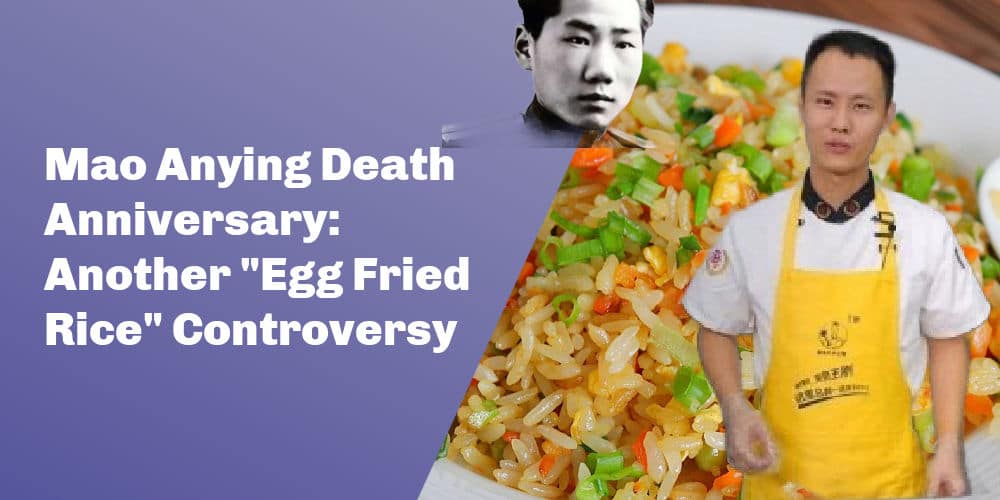
Much Ado About Fried Eggs
Mao Anying, Chinese military officer and the son of Mao Zedong, died on November 25 in 1950. Every year, there are some sensitivities surrounding this date because of fried egg rice. One part of Mao Anying’s death that has become an ongoing, urban-legend-kind-of online story is that he supposedly disobeyed army rules and cooked egg fried rice at the Chinese headquarters in the North Korean battlefield. The smoke of the fire supposedly alerted the enemy and led to the bombing in which he would lose his life. The anniversary of Mao Anying’s death has therefore come to be mocked and celebrated by some netizens as “Egg Fried Rice Day” (蛋炒饭节) or “Chinese Thanksgiving” (中国感恩节), since it’s close to the American Thanksgiving.
A few years ago, the sensitive nature of this meme became clear when Chinese celebrity chef Wang Gang (王刚), with many social media followers, uploaded a video on how to prepare Yangzhou-style fried rice. As described by Dennis E. Yi (2020), the chef was accused of “humiliating China” due to the alleged – and perhaps unintentional – connection to Mao Anying.
This year, Wang Gang once again found himself apologizing for sharing an egg fried rice tutorial around the anniversary of Mao Anying’s death, sparking allegations of disrespect towards Mao Zedong’s son. As this marked the third instance of Wang Gang facing backlash over fried rice, he has now pledged to refrain from making egg fried rice in the future (“作为厨子,以后再也不做炒饭”). Relevant hashtag pages have since been removed from Weibo.
If you want to know more about a renewed focus on Mao Anying in Chinese online media, where official voices communicate why – and in which way – Mao Anying needs to be remembered by the Chinese people, do read this feature article we published in 2022.
What’s Popular

Why Shaoxing Opera is Popular Among Chinese Youth
Yue opera (越剧), also known as Shaoxing opera, is a Chinese opera genre that originated in Zhejiang Province and is particularly popular in Shanghai. Although Chinese opera is generally mostly loved by China’s older generations, new adaptations of classic plays or films featuring a fresh generation of opera performers have now also generated a buzz among China’s younger audiences.
Recently, it’s Yue opera New Dragon Gate Inn (新龙门客栈) that has gone viral, featuring six actresses (they also play the roles of men) of the Zhejiang Xiaobaihua (小百花) troupe. The play is actually an adaptation of the 1992 martial arts film. One actress in particular has become popular online for her cross-gender acting (女扮男装), namely Chen Lijun (陈丽君), who plays the role of Jia Ting. She joined the Xiaobaihua troupe in 2013, right after her graduation.
The online succes of this show (and other ones, including Butterfly Lovers 梁祝) and their performers has led to a run on opera tickets and has cultivated a new kind of theater audience. New Dragon Gate Inn is performed at the Butterfly studio theater in Hangzhou (杭州蝴蝶剧场) and uses immersive theater styles to break away from traditional forms of opera performance. If you want to grab a ticket, you’ll have to really try since you’ll join thousands of others who are eagerly waiting to attend one of the shows in real life.
What’s Memorable

One Year Since White Paper Protests
Exactly one year ago, news of protest movements popping up in various cities across China went buzzing around the internet. After enduring months of stringent Covid measures, students in Nanjing and Xi’an gathered around campus and held up blank paper sheets in protest of censorship. Their white papers said what could not be expressed, and so the movement was soon dubbed the “white paper protest” or the “A4 Revolution.”
Unrest and protests happened from Urumqi to Nanjing, from Beijing to Shanghai. People sang the ‘Farewell’ song (送别) to commemorate those who died in the tragic 11.24 Urumqi fire and who spent the last 100 days of their lives in lockdown. Online, people used various hashtags and posted clips of ‘Do you Hear the People Sing’ from Les Misérables.
But while news of the protests made global headlines, the terms “outside forces” or “external forces” (外部势力) increasingly popped up in Chinese social media discussions. Boosted by nationalistic bloggers, the idea that foreign forces were meddling in China’s affairs became more prevalent as a way to explain the sudden wave of protests . Read more in this newsletter’s pick from our archive below.
Weibo Word of the Week
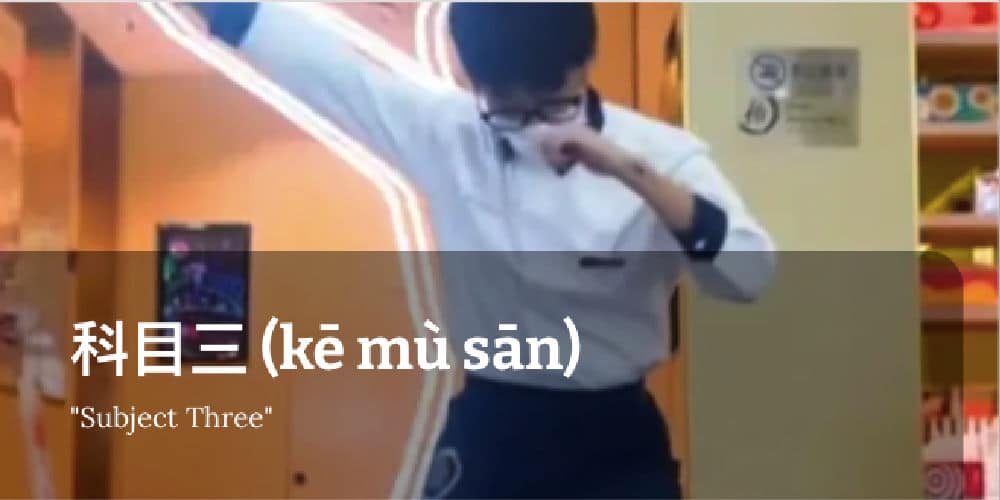
“Subject Three” | Our Weibo Word of the Week is “Subject Three” (kē mù sān 科目三).
Recently, ‘Subject Three’ has become a buzzword on Chinese social media in connection with a viral dance, the Subject Three Dance (科目三舞蹈). From Douyin to Bilibili, the dance is super popular online and is performed by various people, from online influencers to virtual vloggers. The dance has become especially big since the renowned Chinese hotpot chain, Haidilao, allowed its staff to perform this viral dance for diners upon request, leading to amusing and occasionally awkward situations. On November 28, one customer even turned violent when he found the Subject Three performance at a local Huai’an restaurant too noisy and annoying.
The term ‘Subject Three’ allegedly first gained traction in 2022 or early 2023 following a video showcasing the jubilant atmosphere of a Guangxi wedding. Subsequently, ‘Guangxi Subject Three’ (广西科目三) became a popular reference, originating from a humorous joke. Although traditionally associated with the third part of a driver’s license exam, people playfully suggested that Guangxi locals undergo three significant “exams” in their lifetime: one for singing folk songs, one for mastering the art of slurping rice noodles, and the third for dancing (“广西人一生中会经历三场考试,科目一唱山歌,科目二嗦米粉,科目三跳舞”).
By now, the dance has transcended its original context of Guangxi weddings and Haidilao staff dances, as it’s turned into a true social media hype where people create and share videos of themselves and others performing the Subject Three Dance, which is characterized by playful and exaggerated movements accompanied by the background music of “江湖一笑” (Jianghu Smile), making it entertaining, humorous, and, most of all, meme-worthy.
This is an on-site version of the Weibo Watch newsletter by What’s on Weibo. Missed last week’s newsletter? Find it here. If you are already subscribed to What’s on Weibo but are not yet receiving this newsletter in your inbox, please contact us directly to let us know.
Stories that are authored by the What's on Weibo Team are the stories that multiple authors contributed to. Please check the names at the end of the articles to see who the authors are.

You may like
Newsletter
IShowSpeed in China: Streaming China’s Stories Well
Published
3 weeks agoon
March 30, 2025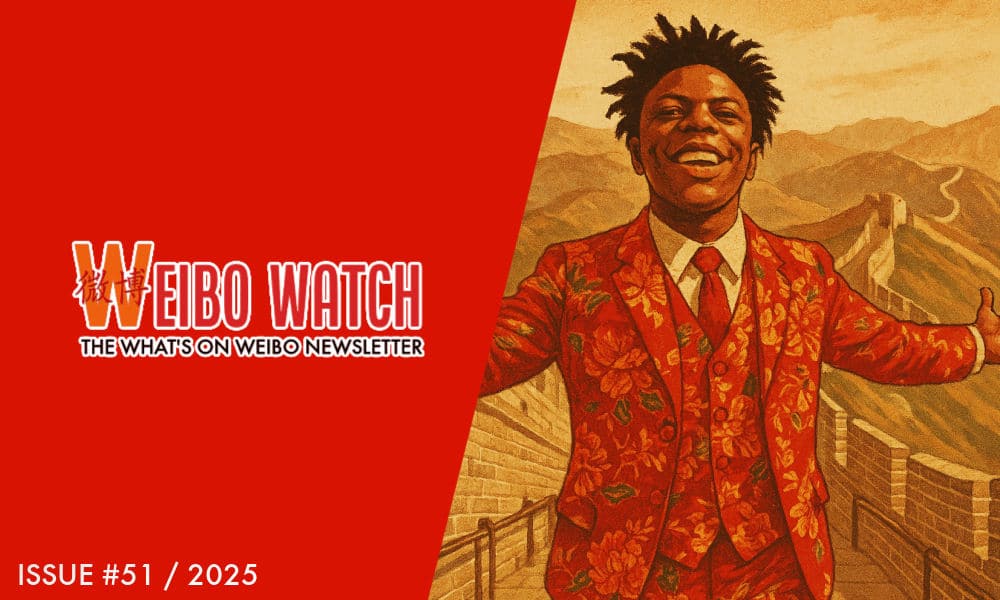
“This man is doing God’s work. In just six hours, he eliminated all Western media propaganda about China,” Chinese influencer Li Sanjin (李三金) said in one of his videos this week. The man he referred to, allegedly doing ‘God’s work,’ is the American YouTuber and online streamer Darren Watkins, better known as IShowSpeed or Speed, who visited China this week and livestreamed from various locations.
With 37 million followers on his YouTube account, Watkins’ visit hasn’t exactly flown under the radar. His streams from China have already accumulated over 17.5 million views on YouTube alone, and he also became the talk of the week on Chinese social media.
In China, the 20-year-old IShowSpeed is known as Jiǎkànggē (甲亢哥), or “Hyper Bro,” since the immensely popular YouTube star is known for being highly energetic.
Although IShowSpeed is originally known for soccer and gaming-related content, he’s been streaming live from various countries over the past year, from Ecuador to Bolivia, from Australia to Indonesia, from Romania to Japan, and also from the Netherlands, where a mob of fans harassed the YouTuber to such an extent that the influencer fled and panicked, until the police intervened and asked him to shut down the livestream for safety reasons — which he did not comply with.
It was not the only time IShowSpeed’s visit got chaotic. He also got into trouble during livestreams from other countries. While streaming from Norway, he injured his ankle and was swarmed by a crowd while trying to get out. In Greece and Indonesia, he had to ask for police support as well. In Thailand, he crashed a tuk-tuk into a temple wall.
In China, IShowSpeed’s livestreams went far more smoothly, and netizens, state media, and other official channels raved about his visit and its favorable portrayal of the country and its culture.
🔹 Symbol of Cultural Exchange & Positive Diplomacy
“Jiǎkànggē” became one of the viral terms of the week, on Weibo, Kuaishou, Douyin, and Toutiao. During his China trip, the livestreamer hit several YouTube milestones — not only breaking the 37 million subscriber mark while on stream, but also surpassing the magic number of 10 million views in total.
Watkins, also known for being (sometimes aggressively) loud and chaotic, suddenly emerged as a symbol of cultural exchange and positive diplomacy. The past week saw hashtags such as:
#️⃣”IShowSpeed gives young foreigners a full-window view into China” (#甲亢哥给国外年轻人开了全景天窗#)
#️⃣”IShowSpeed’s Shanghai livestream breaks Western filter on China” (#甲亢哥上海直播打破西方对中国滤镜#)
#️⃣”American influencer IShowSpeed amazed by stable wifi on China’s high-speed train” (#美国网红甲亢哥被高铁稳定网络震惊#)
#️⃣”IShowSpeed praised deep tried tripe for being incredibly delicious” (#甲亢哥赞爆肚太好吃了#), or
#️⃣ “IShowSpeed bridges the cultural divide” (#甲亢哥弥合文化鸿沟#).
While in Chinese media, Watkins was lauded for shining a positive light on China, this message was also promoted on English-language social media, where he was praised by the Chinese embassy in the US (#驻美大使馆称赞甲亢哥中国行#), writing:
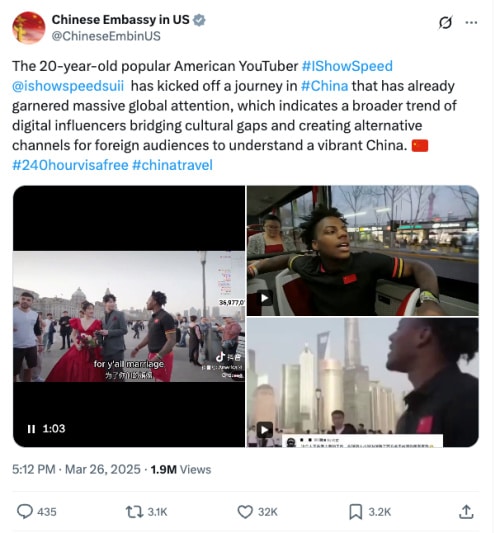
Post by Chinese Embassy in the US on X, March 26.
“This 20-year-old American internet star is bridging cultural gaps through digital means and creating new channels for foreign audiences to better understand China.”
So what exactly did IShowSpeed do while in China?
On March 24, Watkins livestreamed from Shanghai. He wandered around the city center, visited a KFC, danced with fellow streamers, stopped by a marriage market, ate noodles, played ping-pong, had hotpot, joined a dragon dance group and got acquainted with some traditional Chinese opera performance, and walked along the Bund.

On March 26, he streamed from Beijing, starting in Donghuamen before briefly entering the Forbidden City—dressed in a Dongbei-style floral suit. He later took a stroll around Nanluoguxiang and the scenic Houhai lake, rode a train, and finally visited the Great Wall, where he did backflips.

In his stream on March 28, Watkins traveled to Henan to visit the famous Shaolin Temple in Dengfeng, hoping to find a master to teach him kung fu. He trained with Shaolin monks—footage that quickly went viral.
Lastly, on March 29, he opened his own Weibo account and published his first post. On Douyin, he shared a video of his visit to Fuxi Mountain in Zhengzhou, featuring the popular “Stairway to Heaven” tourist spot.
On social media, many viewers were captivated by the content. One major talking point was the remarkably strong internet connection that allowed him to livestream for six-hour stretches without losing signal in Shanghai. (Though his Beijing stream started off patchier, the drop was minor.) For many, it symbolized the quality of China’s 5G services.
Foreign viewers also praised how safe, friendly, and clean the country appeared, and how his streams highlighted various aspects of Chinese culture—from everyday people to traditional arts and local cuisine.
🔹 Telling & Spreading China’s Stories Well
It is no wonder the success of the Jiǎkànggē livestreams is celebrated by Chinese official media in an age where China’s foreign communication aims to increase China’s international discourse power, shaping how the world views China and making that image more credible, more respectable, and more lovable.
That’s not just an observation — it’s an official strategy. Introduced by Xi Jinping in 2013, “Telling China’s Story Well” (“讲好中国故事”) is a political slogan that has become a key propaganda strategy for China and continues to be a priority in finding different ways of promoting Chinese culture — new ways of telling China’s story in the social media age – while countering Western dominant narratives about China.
In increasingly digitalized times, it is not just about telling China’s story well, but also spreading China’s message effectively — preferably through genuine and engaging stories (Cai 2013; Qiushi 2021).
Especially young, non-official ‘storytellers’ can make China’s image more relatable and dynamic. One major example, highlighted in a 2022 case study by Zeng Dan (曾丹), is Chinese influencer Li Ziqi (李子柒). You’ve probably heard of her, or seen snippets of her videos: she creates soothing, cinematic content depicting China’s countryside lifestyle, focused on cooking, crafts, and gardening. With 26 million followers on YouTube, Li Ziqi became a viral sensation who successfully communicated an authentic and appealing ‘China story’ to a broad global audience.

Li Ziqi in one of her YouTube videos.
Although the calm and composed Li Ziqi and the loud, chaotic IShowSpeed couldn’t be more different, they have some things in common: both have large international fanbases, including their millions of YouTube subscribers; they offer perspectives that differ from Chinese state media or official channels; and they have the capacity not just to tell China’s story well, but to spread it effectively through videos and livestreams.
🔹 Spontaneous Stream or Scripted Propaganda?
IShowSpeed’s China streams have triggered a wave of responses from fans and viewers, sparking discussions across international social media and even making newspaper headlines.
In English-language online media spheres, there appear to be a range of perspectives on Watkins’ China trip:
📌 One prominent view—also echoed by various foreign influencers on YouTube and other platforms—is that IShowSpeed’s visit counters “Western media lies” about China and has successfully shown the “real China” through his livestreams. The Shanghai-based media outlet Radii claimed that “IShowSpeed’s China Tour is doing more for Chinese Soft Power than most diplomats ever could.”
📌 Others challenge this narrative, questioning which dominant Western portrayals of China IShowSpeed has actually disproven. Some argue that the idea of China being a “bleak place with nothing to do where people live in misery” is itself a false narrative, and that presenting IShowSpeed’s livestreams as a counter to that is its own form of propaganda (see: Chopsticks and Trains).
📌 There are also those who see Watkins’ trip as a form of scripted propaganda. To what extent were his livestreams planned or orchestrated? That question has become one of the central points of debate surrounding the hype around his visit.
These rumors have been addressed by cameraman Slipz (@shotbyslipz), who took to X on March 28, 2025. Slipz posted that the team is “(..) not making political content, not any documentary and no journalism,” and later added: “Fact: amount of money IShowSpeed has received from Chinese Government = $0.”

But does the fact that IShowSpeed did not receive money from the Chinese government mean that it wasn’t also a form of China promotion?
➡️ Organized — it definitely was. Any media trip in China has to be. IShowSpeed would have needed a visa, he had translators with him, and throughout the streams it’s evident that local guards and public security officers were present, walking alongside and helping to keep things under control, especially in crowded areas and at major tourist spots — from Nanjing Road in Shanghai to an entire group of guards seemingly accompanying the entourage in the Forbidden City.
One logistical “advantage” to his visit was the fact that YouTube is blocked in China. While some Chinese fans do bypass the Great Firewall to access the platform, IShowSpeed remains far less known in China than in many other countries — a factor that likely contributed to how smoothly the streams went and helped prevent chaos. The team also launched a Douyin account during the trip, where he now has over two million followers. (To stream directly to their 37 million followers on YouTube, Watkins’ team either needed a VPN to access WiFi or had arranged roaming SIM cards to stay connected.)
➡️ Was it staged? Many parts clearly weren’t: casual public conversations, spontaneous barber visits in both Shanghai and Beijing (with barbers looking unsure of how to handle the situation), and wholesome fan encounters. There was even a moment when Watkins walked into a public restroom and forgot to mute the sound.
But other parts of the trip were undeniably staged — or at least framed to appear spontaneous. When visiting a marriage market in Shanghai, for instance, two actors appeared, including one woman with a sign stating she was looking for someone “capable of doing backflips.”
When Watkins took a “random” ride in what was described as the fastest car in China — the Xiaomi SU7 Ultra — the vehicle appeared to be conveniently parked and ready.
Similarly, when the streamer “ran into” Chinese-American TikTok influencer Miles Moretti (李美越) in Beijing, it turned out to be the person who would give him the now-iconic bright Dongbei flower suit and accompany him on his journey.

The ping-pong, the kung fu, the Peking opera, the hotpot, the Forbidden City tour — it all plays into the kinds of experiences that official channels also like to highlight. While likely planned by Watkins’ team in coordination with local partners, it was all far more orderly and tourism-focused than, for example, Watkins’ chaotic visit to the Netherlands.
Watkins and his entourage were also well-informed about the local dos and don’ts. At one point, Watkins even mentions “following the rules,” and when Moretti tells him mid-stream that “somebody very important lives on our left,” Watkins asks “Who?” — but the camera zooms out and the question goes unanswered, suggesting they may have been reminded that certain names or topics were off-limits (judge the moment for yourself here).
The livestream didn’t always go exactly the way Watkins wanted, either. When he attempted to take more random walks around the city, the crew appeared to be informed that some areas were off-limits, and he was asked to return to the car to continue the trip (clips here and here).
🔹 The “Nàge” Song
One major talking point surrounding IShowSpeed’s China livestreams was “the N-word.” No, not that N-word — but the Chinese filler word “nàge” or “nèige” (那个). Like “uhm” in English or “eto” in Japanese, “nàge” is a hesitation marker commonly used in everyday Mandarin conversation. It also functions as a demonstrative pronoun meaning “that.”
The word has previously stirred controversy because of its phonetic resemblance to a racial slur in English. In 2020, an American professor at the University of Southern California’s Marshall School of Business was even temporarily suspended after using the word during an online communications class — some students misunderstood its context and took offense.
The word — and the song “Sunshine, Rainbow, White Pony” (阳光彩虹小白马) by Chinese singer Wowkie Zhang (大张伟), which repeatedly features the word nàge in its chorus — popped up multiple times during Watkins’ trip. The catchy tune essentially became the theme song of his visit.
The first nàge moment actually already appeared within the first five minutes of Watkins’ Shanghai stream, when a Chinese comedian approached him on the street, trying to recall a joke. “What?!” Watkins reacted, with laughter in the background. “That’s not a joke, you said n**! It’s my first five minutes in China!” he exclaimed, before patting the man’s back in a friendly gesture, clearly not offended.
🔄 It resurfaced again within the first hour when Watkins visited a marriage market and one of the performers sang the Wowkie Zhang song. Watkins initially acted shocked, then demanded they sing it again — only to burst out laughing and start singing along.
🔄 Later, he sang the song again with a street saxophonist and encouraged others to join in.
🔄 At other moments, he played up the drama again, feigning anger when a crowd broke into the chorus, and it became a recurring gag throughout the streams.
These incidents all seem staged. One of the main reasons Watkins is known to many netizens in China is because of an older video clip showing his exaggerated reaction to the nàge song — dating back to at least 2022. So while it may have looked spontaneous, Watkins was already familiar with the word and the viral song long before his China trip.The attention given to the nàge ‘controversy’ was likely amplified for views and engagement.
While Watkins was clearly in on this part of the show — as with others — he also seemed genuinely, and at times amusingly, unaware of many things in China. He repeatedly referred to RMB as “dollars,” mistook elderly women for retired YouTube streamers, and even assumed that a woman livestreaming near the Forbidden City was reading his chat and trying to collaborate with him — although she seemed totally uninterested and was just minding her own business.
🔹 A Win-Win Situation
In the end, IShowSpeed’s visit highlighted two sides effectively doing their job. Watkins and his team successfully arranged a YouTube trip that generated high ad revenue, attracted millions of new subscribers, and boosted his brand and global fame.
On the Chinese side, there was clearly coordination behind the scenes to ensure the trip went smoothly: avoiding controversy, ensuring safety, and showcasing positive aspects of Chinese culture. From traditional opera and kung fu to ping pong, IShowSpeed’s content gave center stage to the kinds of cultural highlights that align closely with China’s official narratives and tourism goals. Even if the government didn’t pay the YouTuber directly, as his team has emphasized (and there’s no reason to doubt them), the trip still fit seamlessly into China’s soft power strategy.
IShowSpeed’s China visit has created a unique media moment that resonates for several reasons: it’s the encounter of a young modern American with old traditional China; it is a streamer known for chaos visiting a nation known for control. And it brings different benefits to both sides: clicks and ad revenue for IShowSpeed, and free foreign-facing publicity for China.
No, IShowSpeed didn’t undo years of critical Western media coverage on China. But what his visit shows is that we’ve entered a phase where China is becoming more skilled at letting others help tell its story — in ways that resonate with a global, young, online audience. He didn’t do “God’s work.” He simply did what he always does: stream. And with China’s help, he streamed China very well.
There’s so much more I want to share with you this week — from Chinese reactions to the devastating Myanmar earthquake, to a recent podcast I joined with Dutch newspaper De Telegraaf (link in Dutch, for those interested). But it also happens to be my birthday today, and I’m really hoping to still grab some birthday hotpot — so I’ll wrap this up here. I’ll keep you informed on the other trends in the next newsletter.📨.
Best,
Manya
(@manyapan)
References:
Cai, Mingzhao 蔡名照. 2013. “Telling China’s Stories Well and Spreading China’s Voice: Thoroughly Studying and Implementing the Spirit of Comrade Xi Jinping’s Important Speech at the National Conference on Propaganda and Ideological Work [讲好中国故事,传播好中国声音——深入学习贯彻习近平同志在全国宣传思想工作会议上的重要讲话精神].” People’s Daily 人民日报, October 10. http://politics.people.com.cn/n/2013/1010/c1001-23144775.html. Accessed March 29.
Qiushi 求是网. 2021. “Xi Jinping: Telling China’s Story Well, Spread China’s Voice Well [习近平:讲好中国故事,传播好中国声音].” Qs Theory, June 6. http://www.qstheory.cn/zhuanqu/2021-06/02/c_1127522386.htm. Accessed March 29.
Zeng Dan 曾丹. 2022. “How to Tell China’s Story Well: Taking Li Ziqi as an Example [如何讲好中国故事——以李子柒为例].” Progress in Social Sciences 社会科学进展 4 (1): 10–19. https://doi.org/10.35534/pss.0401002.
What’s Featured

Quite terrifying and interesting, as this trending story touched upon so many different issues.
What started as a single snarky comment on Weibo spiraled into an online witch hunt, exposing not just some dark sides of online Kpop fandom but also, most importantly, the vulnerabilities in China’s digital privacy.
Read the story, the latest by Ruixin Zhang 👀
This is an on-site version of the Weibo Watch newsletter by What’s on Weibo. Missed last week’s newsletter? Find it here. If you are already subscribed to What’s on Weibo but are not yet receiving this newsletter in your inbox, please contact us directly to let us know.
Newsletter
Weibo Watch: The Great Squat vs Sitting Toilet Debate in China🧻
This week, the Catch-22 of sitting versus squat toilets sparked heated discussion on Weibo after a Beijing News article exposed the messy reality of sitting toilets in Beijing malls.
Published
4 weeks agoon
March 23, 2025
PREMIUM NEWSLETTER | ISSUE #50
Dear Reader,
Shoe prints on top of the toilet seat are never a pretty sight. To prevent people from squatting over Western-style sitting toilets, there are some places that will place stickers above the toilet, reminding people that standing on the seat is strictly forbidden.

For years, this problem has sparked debate. Initially, these discussions would mostly take place outside of China, in places with a large number of Chinese tourists. In Switzerland, for example, the famous Rigi Railways caused controversy for introducing separate trains with special signs explaining to tourists, especially from China, how (not) to use the toilet.
Squat toilets are common across public areas in China, especially in rural regions, for a mix of historical, cultural, and practical reasons. There is also a long-held belief — backed by studies (like here or here) — that the squatting position is healthier for bowel movements (for more about the history of squat toilets in China, see Sixth Tone’s insightful article here).
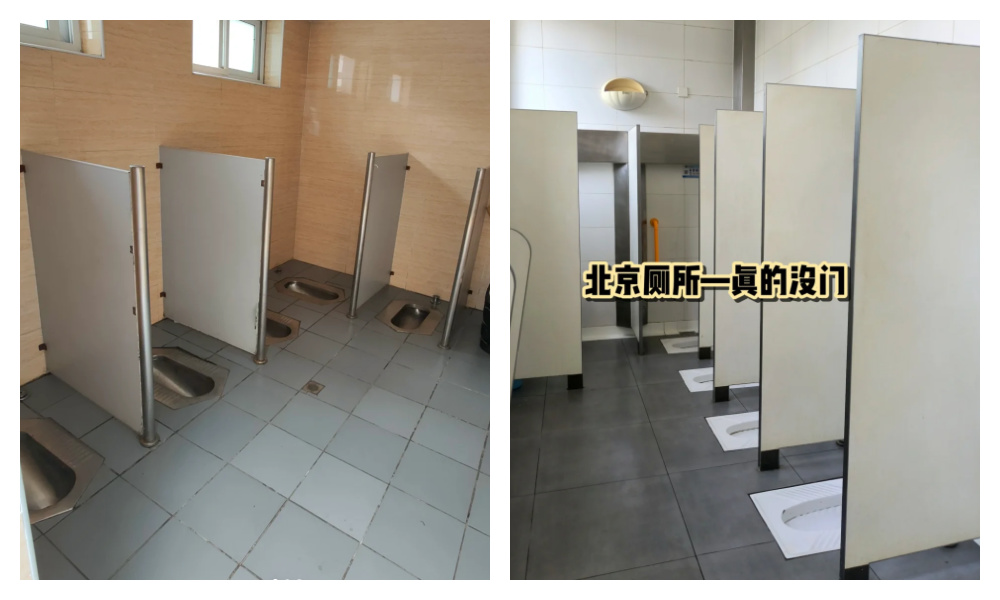
Public squatting toilets in Beijing, images via Xiaohongshu.
Without access to the ground-level squat toilets they are used to — and feel more comfortable with — some people will climb on top of sitting toilets to use them in the way they’re accustomed to, seeing squatting as the more natural and hygienic method.

Not only does this make the toilet seat all messy and muddy, it is also quite a dangerous stunt to pull, can break the toilet, and lead to pee and poo going into all kinds of unintended directions. Quite shitty.

Squatting on toilets makes the seat dirty and can even break the toilet.
Along with the rapid modernization of Chinese public facilities and the country’s “Toilet Revolution” over the past decade, sitting toilets have become more common in urban areas, and thus the sitting-toilet-used-as-squat-toilet problem is increasingly becoming topic of public debate within China.
The Toilet Committee and Preference for Sitting Toilets
Is China slowly shifting to sitting toilets? Especially in modern malls in cities like Beijing, or even at airports, you see an increasing number of Western-style sitting toilets (坐厕) rather than squatting toilets (蹲厕).
This shift is due to several factors:
🚽📌 First, one major reason for the rise in sitting toilets in Chinese public places is to accommodate (foreign) tourists.
In 2015, China Daily reported that one of the most common complaints among international visitors was the poor condition of public toilets — a serious issue considering tourists are estimated to use public restrooms over 27 billion times per year.
That same year, China’s so-called “Toilet Revolution” (厕所革命) began gaining momentum. While not a centralized campaign, it marked a nationwide push to upgrade toilets across the country and improve sanitation systems to make them cleaner, safer, and more modern.
This movement was largely led by the tourism sector, with the needs of both domestic and international travelers in mind. These efforts, and the buzzword “Toilet Revolution,” especially gained attention when Xi Jinping publicly endorsed the campaign and connected it to promoting civilized tourism.
In that sense, China’s toilet revolution is also a “tourism toilet revolution” (旅游厕所革命), part of improving not just hygiene, but the national image presented to the world (Cheng et al. 2018; Li 2015).
🚽📌 Second, the growing number of sitting toilets in malls and other (semi)public spaces in Beijing relates to the idea that Western-style toilets are more sanitary.
Although various studies comparing the benefits of squatting and sitting toilets show mixed outcomes, sitting toilets — especially in shared restrooms — are generally considered more hygienic as they release fewer airborne germs after flushing and reduce the risk of infection (Ali 2022).
There are additional reasons why sitting toilets are favored in new toilet designs. According to Liang Ji (梁骥), vice-secretary of the Toilet Committee of the China Urban Environmental Sanitation Association (中国城市环境卫生协会厕所专业委员会), sitting toilets are also increasingly being introduced in public spaces due to practical concerns.
🚽📌 Squatting is not always easy, and can pose a safety risk, particularly for the elderly, pregnant women, and people with disabilities.
🚽📌 Then there are economic reasons: building squat toilets in malls (or elsewhere) requires a deeper floor design due to the sunken space needed below the fixture, which increases both construction time and cost.
🚽📌 Liang also points to an aesthetic factor: sitting toilets simply look more “high-end” and are easier to clean, which is why many consumer-oriented spaces prefer to install Western-style toilets.
So although there are plenty of reasons why sitting toilets are becoming a norm in newly built public spaces and trendy malls, they also lead to footprints on toilet seats — and all the problems that come with it.
The Catch 22 of Sitting vs Squad Toilets
This week, the issue became a trending topic on Weibo after Beijing News published an investigative report on it. The report suggested that most shopping malls in Beijing now have restrooms with sitting toilets, which should, in theory, be cleaner than the squat toilets of the past — but in reality, they’re often dirtier because people stand on them. This issue is more common in women’s restrooms, as men’s restrooms typically include urinals.
In researching the issue, a reporter visited several Beijing malls. In one women’s restroom, the reporter observed 23 people entering within five minutes. Although the restroom had only three squat toilets versus seven sitting ones, around 70% of the users opted for the squat toilets.
Upon inspection, most of the seven sitting toilets were dirty — despite being equipped with disposable seat covers — showing clear signs of urine stains and footprints. They found that sitting toilets being used as squat toilets is extremely common.
It’s a bit of a Catch-22. People generally prefer clean toilets, and there’s also a widespread preference for squat toilets. This leads to sitting toilets being used as squat toilets, which makes them dirty — reinforcing the preference for squat toilets, since the sitting toilets, though meant to be cleaner, end up dirtier.
In interviews with 20 women, nearly 80% said they either hover in a squat or directly squat on the toilet seat. One woman said, “I won’t sit unless I absolutely have to.” While some of those quoted in the article said that sitting toilets are more comfortable, especially for elderly people, they are still not preferred when the seats are not clean.
In the Beijing News article, the Toilet Committee’s Liang Ji suggested that while a balanced ratio of squat and sitting toilets is necessary, a gradual shift toward sitting toilets is likely the future for public restrooms in China.

How NOT to use the sitting toilet. Sign photographed by Xiaohongshu user @FREAK.00.com.
Liang also highlighted the importance of correct toilet use and the need to consider public habits in toilet design.
In Squatting We Trust
On Chinese social media, however, the majority of commenters support squatting toilets. One popular comment said:
💬 “Please make all public toilets squat toilets, with just one sitting toilet reserved for people with disabilities.”

Squatting toilets in a public toilet in a Beijing hutong area, image by Xiaohongshu user @00后饭桶.
The preference for squatting, however, doesn’t always come down to bowel movements or tradition. Many cite a lack of trust in how others use public toilets:
💬 “When it comes to things for public use, it’s best to reduce touching them directly. Honestly, I don’t trust other people…”
💬 “Squatting is the most hygienic. At least I don’t have to worry about touching something others touched with their skin.”
💬 “I hate it when all the toilets in the women’s restroom at the mall are sitting toilets. I’m almost mastering the art of doing the martial-arts squat (蹲马步).”
Others view the gradual shift toward sitting toilets as a result of Westernization:
💬 “Sitting toilets are a product of widespread ‘Westernization’ back in the day — the further south you go, the worse it gets.”
But some come to the defense of sitting toilets:
💬 “Are there really still people who think squat toilets are cleaner? The chances of stepping in poop with squat toilets are way higher than with sitting ones. Sitting toilet seats can be wiped with disinfectant or covered with paper. Some people only care about keeping themselves ‘clean’ without thinking about whether the next person might end up stepping in their mess.”
💬 One reply bluntly said: “I don’t use sitting toilets. If that’s all there is, I’ll just squat on top of it. Not even gonna bother wiping it.”
It’s clear this debate is far from over, and the issue of people standing on toilet seats isn’t going away anytime soon. As China’s toilet revolution continues, various Toilet Committees across the country may need to rethink their strategies — especially if they continue leaning toward installing more sitting toilets in public spaces.
As always, Taobao has a solution. For just 50 RMB (~$6.70), you can order an anti-slip sitting-to-squatting toilet aid through the popular e-commerce platform.

The Taobao solution.
For Chinese malls, offering these might be cheaper than dealing with broken toilets and the never-ending battle against footprints on toilet seats…
Best,
Manya
(@manyapan)
References:
Ali, Wajid, Dong-zi An, Ya-fei Yang, Bei-bei Cui, Jia-xin Ma, Hao Zhu, Ming Li, Xiao-Jun Ai, and Cheng Yan. 2022. “Comparing Bioaerosol Emission after Flushing in Squat and Bidet Toilets: Quantitative Microbial Risk Assessment for Defecation and Hand Washing Postures.” Building and Environment 221: 109284. https://doi.org/10.1016/j.buildenv.2022.109284.
Bhattacharya, Sudip, Vijay Kumar Chattu, and Amarjeet Singh. 2019. “Health Promotion and Prevention of Bowel Disorders Through Toilet Designs: A Myth or Reality?” Journal of Education and Health Promotion 8 (40). https://doi.org/10.4103/jehp.jehp_198_18.
Cao, Jingrui 曹晶瑞, and Tian Jiexiong 田杰雄. 2025. “城市微调查|商场女卫生间,坐厕为何频频变“蹲坑”? [In Shopping Mall Women’s Restrooms, Why Do Sitting Toilets Frequently Turn into ‘Squat Toilets’?]” Beijing News, March 20. https://weibo.com/ttarticle/p/show?id=2309405146044773302810. Accessed March 19, 2025.
Cheng, Shikun, Zifu Li, Sayed Mohammad Nazim Uddin, Heinz-Peter Mang, Xiaoqin Zhou, Jian Zhang, Lei Zheng, and Lingling Zhang. 2018. “Toilet Revolution in China.” Journal of Environmental Management 216: 347–356. https://doi.org/10.1016/j.jenvman.2017.09.043.
Dai, Wangyun. 2018. “Seats, Squats, and Leaves: A Brief History of Chinese Toilets.” Sixth Tone, January 13. https://www.sixthtone.com/news/1001550. Accessed March 22, 2025.
Li, Jinzao. 2015. “Toilet Revolution for Tourism Evolution.” China Daily, April 7. https://europe.chinadaily.com.cn/opinion/2015-04/07/content_20012249_2.htm. Accessed March 22, 2025.
China’s Online Discourse on the Russia-Ukraine War

In case you missed it in our earlier newsletter, we recently published the article “US-Russia Rapprochement and ‘Saint Zelensky’: Chinese Online Reactions to Trump’s Shake-Up” as part of our What’s on Weibo Chapters. For more insights into how the war is discussed on Chinese social media, you can catch up here.
Stay tuned — we’re publishing another article on this topic later this week, exploring the unexpected connection between the Russia-Ukraine war and Chinese cosplayers.
What’s Trending
🍏 Chinese Netizens Turn to Tim Cook Over Factory’s Illegal Overtime
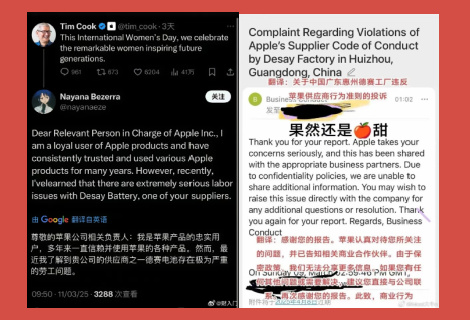
Netizens have recently started reaching out to Apple and its CEO Tim Cook in order to put pressure on a Chinese battery factory accused of violating labor laws. The controversy involves the Huizhou factory of Desay Battery (德赛电池), known for producing lithium batteries for the high-end smartphone market, including Apple and Samsung. The factory caught netizens’ attention after a worker exposed in a video that his superiors were deducting three days of wages because he worked an 8-hour shift instead of the company’s “mandatory 10-hour on-duty.” Compulsory overtime violates China’s labor laws.
In response, the worker and other netizens started to let Apple know about the situation through email and social media, trying to put pressure on the factory by highlighting its position in the Apple supply chain. By now, Desay Battery issued an official statement, admitting to “management oversights regarding employee rights protection” (“保障员工权益的管理上存在疏漏”) and promising to do better in safeguarding employee rights.
It’s an interesting story, and some commentators suggest that it shows that Chinese workers can effectively expose labor violations by reporting them to Western suppliers or EU regulators. But opinions vary. Others are less optimistic about the effectiveness, arguing that companies like Apple would be quick to drop suppliers over product quality issues but more willing to turn a blind eye to labor violations—since cheap labor remains a key competitive advantage in Chinese manufacturing.
💸 From Patriotic Influencer to Tax Evader: Sima Nan Fined More Than Nine Million Yuan

China’s well-known nationalist blogger Sima Nan (司马南) became a trending topic on Friday after being hit with a 9 million RMB ($1.2 million) fine for tax evasion. According to state media, from 2019 to 2023, he underpaid millions of yuan in personal income tax and other taxes by concealing income and submitting false declarations.
Sima responded to media, saying he fully admits guilt. At the same time he’s also blaming the multi-channel network that allegedly was in charge of paying taxes on his behalf at the time.
📌 Noteworthy: Sima Nan promised that- if he’ll still be allowed to have his social media presence – he would in detail explain how he ended up becoming a tax evader. This is kind of funny, because it shows just how good he is in what he does, turning his PR crisis into an opportunity for clicks and views 📈 (yes we do want to know how he went from patriotic influencer to becoming a multi-million tax dodger).
📌Public reaction: The most recurring comments I’ve seen on Weibo is that people are amazed at his high income. They note the hypocrisy of a nationalist, patriotic influencer who’s always preaching truth & justice evading taxes himself, and also conclude that being a nationalist is truly a money-making business🤑🇨🇳
💔 Tragedy at Hubei University: Zhang Yuzhen’s Disappearance and Aftermath

The disappearance of 19-year-old Chinese student Zhang Yuzhen (张钰臻) has captured nationwide attention this week. Zhang did not return after leaving her campus at Hubei University around 5 p.m. on March 15. Her phone remained traceable until 5:54 p.m., about one kilometer from campus. The case became a hot topic as millions of netizens turned into online sleuths, searching for clues that might lead to Zhang’s whereabouts.
On the afternoon of March 20, it was reported that Zhang’s personal items — including her keys and glasses — were discovered by a passerby next to a lake near the university. Police then began searching the lake. By that evening, her remains were found. The case is still under investigation.
There has been some online criticism regarding how the university handled Zhang’s disappearance. Although she was last seen on March 15, it wasn’t until March 18 that her parents were notified by a school counselor. They then reported her missing to the police, after which the school began cooperating with the investigation.
Now, there is also much discussion surrounding the behavior of Zhang’s mother, who has been publicly expressing her grief and anger on Douyin. After learning of her daughter’s death, she became emotionally distraught — screaming, crying, and demanding answers. She seemingly caused some public disturbance when she was prevented from immediately seeing her daughter’s remains, and was also not allowed to leave her hotel (perhaps due to concerns over her emotional state, though details remain unclear at this time). While some online voices have criticized her behavior, many are calling for empathy, arguing that any mother who has just lost her child would be desperate and distraught.
What’s Noteworthy

“The world is so big, I want to go out and see it” (Shìjiè nàme dà, wǒ xiǎng qù kànkan “世界那么大,我想去看看”).
This ten-character sentence became part of China’s collective social media memory after a teacher’s resignation note went viral in 2015. Now, a decade later, the phrase has gone viral once again.
In April 2015, the phrase caused a huge buzz on China’s social media when the female teacher Gu Shaoqiang (顾少强) at Zhengzhou’s Henan Experimental High School resigned from her job. Working as a psychology teacher for 11 years, she gave a class in which she made students write a letter to their future self. The exercise made her realize that she, too, wanted more from life. Despite having little savings, she submitted a simple resignation note that read: “The world is so big, I want to go out and see it.”
The resignation letter was approved, and she posted it to social media.
The letter resonated with millions of Chinese who felt they also wanted to do something different with their life, like go and travel, see the world, and escape the pressures and routines of their daily life. The phrase became so popular that it was adapted in all kinds of ways and manners, by meme creators, in books, by brands, and even by Xi Jinping, who said: “China’s market is so big, we welcome everyone to come and see it” (“中国市场这么大,欢迎大家都来看看”).
This week, Lěngshān Record (冷杉Record), the Wechat account under Chinese media outlet Phoenix Weekly (凤凰周刊), revisited the phrase and published a short documentary about Gu’s life after the resignation and the hype surrounding it.
An earlier news article about Gu’s life post-resignation already disclosed that Gu, despite receiving many sponsorship deals, never actually extensively traveled the world. In the short documentary, Gu explains that she chose to “return home after seeing the world.” By this, she doesn’t mean traveling extensively abroad, but rather gaining life experience in a broader sense. While she did travel, it was within China, including in Tibet and Qinghai.
What truly changed was her life path. She left Zhengzhou and relocated to Chengdu to be near Yu Fu (于夫), a man she had met just weeks earlier by chance during a trip to Yunnan. Six months after the resignation letter, she married him. Together, they ended up opening a hostel near Chengdu, married, and had a daughter.
Gu, now 45 years old, has been back in her hometown of Zhengzhou for the past years, caring for her aging mother and 9-year-old daughter. She is living separately from her husband, who manages their business in Chengdu. She also runs her own livestreaming and online parenting consultancy business.
Although the woman who wanted to “see the world” ended up back home, she has zero regrets about what she did, suggesting her courage to step out of the life she found limiting ultimately transformed her in a meaningful way.
On Chinese social media, the topic went trending on March 19. Most people cannot believe it’s already been ten years since the sentence went trending (“What? How could time fly like that?”). Others, however, wonder about the hopes and dreams behind the original message—and how it all turned out.
💬 “Seeing the world? She just escaped her old life, got married, and had a baby. How is that ‘seeing the world’?” one commenter wondered (@-NANA酱- ).
💬 “The world is so big—what did she end up seeing?” others questioned. “She went from Zhengzhou to Chengdu.”
💬 “Seeing the world takes money,” some pointed out.
💬 But others came to her defense, saying that “seeing the world” also means stepping out of your comfort zone and exploring a different life. In the end, Gu certainly did just that.
💬 “She was quite courageous,” another commenter wrote: “She gave up a stable job to go and see the world. Perhaps her life didn’t end up so rich, but the experiences she gained are priceless.”
The world is still big, though, and there’s plenty left for Gu Shaoqiang to see.
Also read what we wrote about this in 2015: In The Digital Age, ‘Handwritten Weibo’ Have Become All The Rage
What’s Memorable

📚 This pick from our archive is from last year, about Fan Zeng (范曾), the famous Chinese calligrapher, who is turning 87 soon and has a wife 50 years his junior.
This week, some videos featuring Chinese theoretical physicist & Nobel Prize winner Yang Chen-Ning (杨振宁) circulated on social media. Yang is turning 103 this year. Still sharp of mind, and he takes a walk every day.

Yang Chen-ning
In this interview here, when asked about the secret to his longevity, he points to one thing above all: luck.
🍀 Mostly, he suggests it’s the luck of good genes. On his father’s side, diabetes was common, but he was fortunate to inherit his mother’s genes in that regard.
🍚 He also mentions the luck of never experiencing extreme hunger during wartime — he lived in Kunming during those years.
💪 And then he stresses the importance of taking walks, every day, since he was about 70. Keep moving, keep the blood flowing!
What he doesn’t mention, however, is that his wife, Weng Fang (翁帆), is 54 years (!) his junior — I’m pretty sure she helps keep him young too…
Fan and Yang are good friends, and Yang’s good health might have inspired him to marry his 50-years-younger girlfriend last year. Read more 👇
This is an on-site version of the Weibo Watch newsletter by What’s on Weibo. Missed last week’s newsletter? Find it here. If you are already subscribed to What’s on Weibo but are not yet receiving this newsletter in your inbox, please contact us directly to let us know.
Popular Reads
-

 China Insight11 months ago
China Insight11 months agoThe Tragic Story of “Fat Cat”: How a Chinese Gamer’s Suicide Went Viral
-

 China Digital10 months ago
China Digital10 months agoChina’s 2024 Gaokao Triggers Online Discussions on AI
-

 China Arts & Entertainment11 months ago
China Arts & Entertainment11 months agoSinging Competition or Patriotic Fight? Hunan TV’s ‘Singer 2024’ Stirs Nationalistic Sentiments
-

 China Arts & Entertainment12 months ago
China Arts & Entertainment12 months ago“Old Bull Eating Young Grass”: 86-Year-Old Chinese Painter Fan Zeng Marries 36-Year-Old Xu Meng






